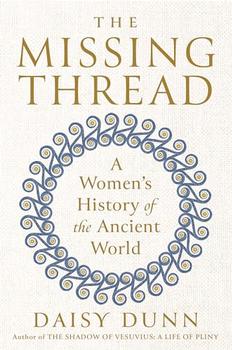Summary | Excerpt | Reviews | Beyond the Book | Readalikes | Genres & Themes | Author Bio

A Women's History of the Ancient World
by Daisy Dunn
'An army of horsemen, some say, or infantry, / Or a fleet of ships is the most beautiful / Thing on black earth, / But I say it's what one loves.' There is such confidence in Sappho's poetic voice. Reading her words can make you feel like you are entering the space between two people caught in the middle of something. They have been having a row, perhaps, or they are trying to say goodbye before one of them leaves on a voyage from which the other fears they will never return. The air between them is yet to clear, but somehow Sappho has swept it up, carried it away to somewhere even more private to scrutinise with what transpires to be the very opposite of an objective eye. Even – especially – when she herself is one of the two people involved and has fair claim to be the injured party.
Sappho was the great poet of longing and jealous desire. Born on the island of Lesbos perhaps eighty years after Hesiod, she did for love poetry what Homer did for epic. People called her the Tenth Muse because her verses appeared to have flittered down from the godly heights of Helicon. She composed hymns for weddings and competitions in addition to the more private, romantic verses other women that won her lasting fame. '... As far as the memory stretch,' wrote a male geographer some six centuries after she lived, 'I do not know of any other woman who has been noted to be any match for her in the art of poetry.'
Sappho may well have been superior to most, but already by the first century, writings of many of her competitors had been lost, making a fair judgement impossible. The ensuing centuries have been even crueller to the survival of women's work. We know the names of many female artists and writers, but possess the works of few. On an Etruscan perfume jar made in Italy in Sappho's lifetime there is inscribed something like a love poem by the otherwise enigmatic Asi Akarai. In the Peloponnese in the third century BC, a woman named Anyte composed touching epitaphs and epigrams about animals and art, more than twenty of which are extant. I have translated some of these together with fragments of other women's writings at the head of each chapter in this book. Erinna, a talented female poet of the fourth century BC, wrote an astonishingly beautiful poem for her childhood friend Baucis, who had died. It was probably the only work that Erinna circulated prior to her own early death at the age of nineteen. In solemn hexameters she recalled how she and Baucis had once played together at being tortoises and fussed over their dolls like little mothers. Erinna related that Baucis' obsessions of new love following her marriage had obtruded on her own childhood memories. Erinna's tribute was known as The Distaff because it interwove passages on weaving with imagery of the mythological Fates spinning the thread that determined the shape and length of mortal lives. Weaving, Pandora's craft, was not only the principal occupation of most women in antiquity, it was a daily reminder of the approach of death.
Weaving made artists of all women, but not all women were content just with weaving. The great first-century encyclopaedist Pliny the Elder credited one Kora of Corinth with the discovery of portraiture after she traced the shadow of her lover's face wall and had her father work up the outline in clay. Pliny of six other professional artists who were women – Timarete, Irene, Calypso, Aristarete, Iaia and Olympias – but not one of pieces has survived. Other kinds of works by women were just occasionally recorded in inscriptions. Phile of Priene in Greek Ionia interesting rarity. In the mid-first century BC she became not only magistrate in her city, but the first known woman to have a reservoir and aqueduct constructed at her own expense.
The importance ancient women's work exceeds the contributions of extraordinary individuals. Together women helped to make antiquity as we know it. They were creators of history. It feels only right to think of them in this collective sense given how many died without being able to leave their own mark upon the world. Millions who perished in childbirth disappeared without so much as their names being carved in stone. As Pericles said in the fifth century BC, 'Great is the glory of the woman who is least spoken about, whether for good or for ill.' Most women followed this trajectory and were therefore lost to history. Even those who were documented in the literary and historical sources were prone to being overshadowed and wilfully miscast. They are too often presented as meddlers in men's lives, bad Pandoras, les femmes à chercher. Good women were defined in Latin by words that need no translation: modestia, pudicitia, castitas, pietas. Such qualities may not stir much excitement in the modern woman, but were we to seek out the rebels alone, we would risk overlooking some of the most fascinating characters in history. It was sometimes by conforming to these very expectations that women achieved immortality. It could be both the greatest compliment and the gravest insult to say, 'She did not act like a woman.'
Excerpted from The Missing Thread by Daisy Dunn. Copyright © 2024 by Daisy Dunn. Excerpted by permission of Penguin Books. All rights reserved. No part of this excerpt may be reproduced or reprinted without permission in writing from the publisher.
Your guide toexceptional books
BookBrowse seeks out and recommends the best in contemporary fiction and nonfiction—books that not only engage and entertain but also deepen our understanding of ourselves and the world around us.